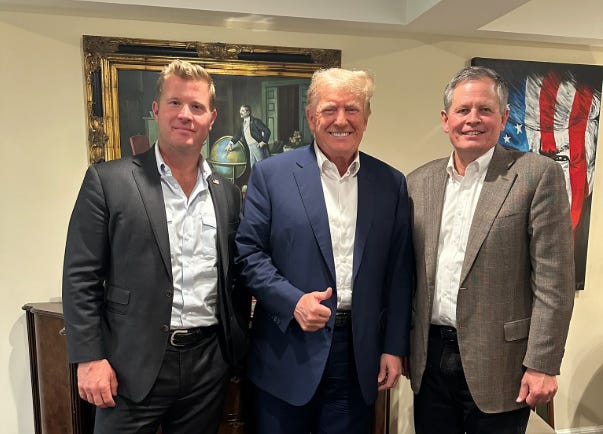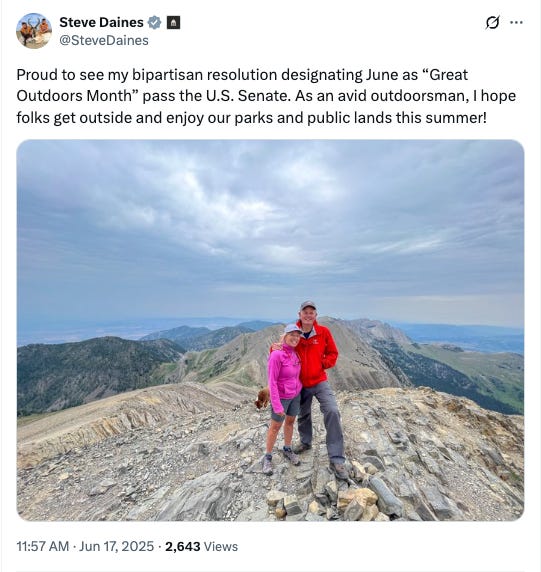Is The Montana Firewall On Public Land Sales Crumbling?
A special carveout for Big Sky Country and crickets from the state’s GOP senators over the last week expose cracks in the Montana delegation’s pro-public lands proclamations.

UPDATE: Shortly after this story published, a spokesperson for Montana Sen. Tim Sheehy told reporter Kylie Mohr that the senator "believes public lands belong in public hands and opposes the sale of public lands. He is pleased to see Montana exempted.”
PREVIOUSLY: Many conservationists, hunters, anglers and other public land advocates have been looking to Montana’s congressional delegation to serve as a firewall against the current GOP push to liquidate millions of acres of federal land out West.
All four Montana Republicans — Sens. Steve Daines and Tim Sheehy and Reps. Ryan Zinke and Troy Downing — have repeatedly said they oppose wholesale sale or transfer of America’s public lands, even as the Montana GOP party platform calls for the “granting of federally managed public lands to the state, and development of a transition plan for the timely and orderly transfer.” Zinke, who served as Interior secretary during Trump’s first term, received accolades after reportedly lobbying for land sale provisions to be stripped from the budget bill that the House passed last month.
But the issue resurfaced with a vengeance on June 11, when Sen. Mike Lee (R-Utah), chair of the powerful Senate Energy and Natural Resources Committee, unveiled his committee’s contribution to the Senate’s version of the massive budget bill, including a provision to sell off as much as 3.2 million acres of public land in 11 western states. Notably, the bill exempts Montana from any future land disposals — apparently at the request of Daines. A spokesperson for Lee told The New York Times that Lee “worked closely” with Daines “to incorporate key feedback” on the bill. It is unclear if Sheehy was involved in those negotiations.
In the week since Lee introduced his wildly unpopular proposal, amid mounting public outrage in Montana and across the country, Daines and Sheehy have managed to avoid addressing the sell-off proposal. If the two self-proclaimed public lands champions were betting that a Montana carveout would provide enough cover to justify voting in favor of a mass public land sell off to help offset President Donald Trump’s tax and spending cuts, they appear to have miscalculated badly.
On social media in recent days, public land advocates and hook and bullet groups have urged their members and audiences to flood the senators' offices with phone calls and letters demanding they vote against the bill. On Friday, Public Domain was sent a picture of Daines’ office in Helena, where someone had tapped a sign outside that read: “Senate Republicans to sell 3.3 million acres of public lands to pay for tax cuts for the wealthy…Tell Daines NO!!” Some of the fiercest backlash to the proposal has come from conservatives, including prominent online influencers like Benji Backer, a conservative environmentalist.
But that public pressure has yet to elicit comment from Daines or Sheehy. Public Domain could find no record of either senator weighing in on Lee’s proposal in the week since it was introduced. No press releases or social media posts pushing back against the effort. No statements to the press, not even Montana outlets, despite reporters’ numerous attempts to pin down how they plan to vote on the bill as written. The Senators did not respond to Public Domain’s requests for comment this week.
On Tuesday, Daines took to social media to celebrate public lands, but said nothing of the current attack on them. He posted a picture of him and his wife atop a mountain and touted a resolution he cosponsored designating June as “Great Outdoors Month.”
“As an avid outdoorsman, I hope folks get outside and enjoy our parks and public lands this summer!” he wrote.
Meanwhile, Daines and Sheehy have continued to champion the bill as a whole, even in the wake of Lee’s proposal to force a public land sell-off. Daines recently called the bill “a necessity.” And in a post to X on Wednesday, Sheehy wrote that its passage would “mean higher wages and higher take-home pay for hardworking families in Montana and all across America. Let’s get it done!”
If the Senate’s version of the GOP budget bill becomes law, there will be up to 3.2 million fewer acres of public land for Americans to enjoy come summer 2030. The bill mandates the Departments of Interior and Agriculture sell off between 0.5 percent and 0.75 percent of the total land held by the Bureau of Land Management and the U.S. Forest Service over the next five years — a combined figure that ranges from 2.19 million and 3.26 million acres.
Michael Carroll, the BLM campaign director for the Wilderness Society, pointed out that the Montana exemption means other Western states, including neighboring Idaho and Wyoming, would be forced to bear a bigger burden of any future public lands sales.
“It puts more pressure on all the other federal public lands,” he said.
Given broad bipartisan public support in Montana and across the country for maintaining public land protections, it’s worth highlighting the extent to which Daines and Sheehy have sought to cast themselves as unwavering defenders of the public domain, and staunch opponents of the kind of land sales that their party has now forced back into the reconciliation bill.
Daines’s senate website features an entire section on public lands, which includes a pledge to “continue to fight for expanded access to our public lands.” Multiple times in recent weeks and months, including after Lee first signaled his intent to reintroduce federal land sales as part of Trump’s so-called “big, beautiful” budget bill, Daines has stated unequivocally that he opposes a public land sell-off.
“Senator Daines never has, and never will support the sale of public lands,” a spokesperson for Daines told the Bozeman Daily Chronicle in April.
Sheehy, who defeated incumbent Sen. Jon Tester (D-Mont.) last year, came under fire during his campaign for voicing support for transferring federal lands to state control and failing to disclose his role at a nonprofit with a history of advocating for privatizing America’s public lands. Sheehy spent months doing damage control, promising that if elected he would “oppose any federal transfer or sale of our public lands.”
In an interview on the MeatEater podcast in April, Sheehy dismissed the idea that Republicans were trying to sell off federal lands as “not an accurate narrative,” and said any future sales would be limited in scope to, for example, lands with old, idle military installations.
“We can’t chip away at that,” Sheehy said of the federal estate. “And if we do, it’s a dangerous precedent we start. And especially here in Montana and our Western states, we know what a magical thing it is to have that. We just have to fight to protect it. That’s a red line for all of us. Our whole Montana delegation is aligned on that, that’s just a nonstarter.”
In April, Daines and Sheehy did buck their party on the issue, joining Democrats in voting for a failed amendment that would have blocked federal lands from being sold off to reduce the federal deficit. But with Lee’s proposal headed for a markup in the Senate Energy and Natural Resources Committee, of which Daines is a member, the real test is around the corner. And many Americans will be looking for Daines and Sheehy, as well as Zinke and Downing, to live up to their promises to keep “public lands in public hands.”
Zinke has indicated he will not waver on the issue.
Zinke “remains a hard no on any bill that includes the large-scale sale of public lands,” his spokesperson, Garrett Brown, told The New York Times late last week.
Carroll of The Wilderness Society applauded Zinke for remaining steadfast in his position and said he’s troubled that Daines and Sheehy haven’t clarified where they stand on Lee’s proposal.
“There’s no improving this language that’s in the bill,” Carroll said. “They need to just draw a hard line in the sand like Zinke and say, ‘No.’”



